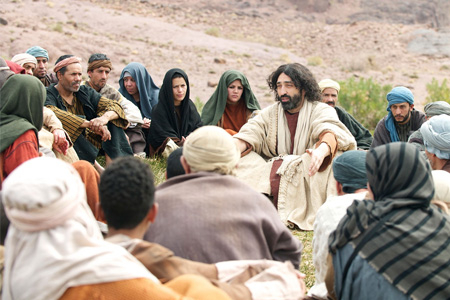When Jesus saw the crowds he felt sorry for them because they were harassed and dejected, like sheep without a shepherd. Then he said to his disciples, ‘The harvest is rich but the labourers are few, so ask the Lord of the harvest to send labourers to his harvest.’
He summoned his twelve disciples, and gave them authority over unclean spirits with power to cast them out and to cure all kinds of diseases and sickness.
These are the names of the twelve apostles: first, Simon who is called Peter, and his brother Andrew; James the son of Zebedee and his brother John; Philip and Bartholomew; Thomas and Matthew, the tax collector; James, the son of Alphaeus, and Thaddaeus; Simon the Zealot and Judas Iscariot, the one who was to betray him. These twelve Jesus sent out, instructing them as follows:
‘Do not turn your steps to pagan territory, and do not enter any Samaritan town; go rather to the lost sheep of the House of Israel. And as you go, proclaim that the kingdom of heaven is close at hand. Cure the sick, raise the dead, cleanse the lepers, cast out devils. You received without charge, give without charge.’ (Matthew 9:36-10:8)
Reflection - Growing disciples
This week’s Gospel contains the first part of Jesus’ instructions to the disciples as they set out on their mission.
At the beginning of the reading we hear that Jesus is moved with compassion for the crowds. He loves them and feels for them and responds to their need since ‘they were harassed and dejected, like sheep without a shepherd’. It is Jesus’ compassion for the people that compels him to act.
Then he urges the whole group of disciples to pray to ‘the Lord of the harvest’ for more labourers. Then, from the broader group of disciples, Jesus chooses twelve who Matthew names as ‘apostles’ or emissaries.
To these twelve Jesus entrusts the mission of proclaiming that the kingdom of God is close at hand. This is not an ‘end of the world’ prediction. We could better translate it as: the kingdom of God is very close to you. To a people who had constantly been told that God despised them, that they were sinners and very far from the kingdom of God, this was good news indeed.
Jesus gives the disciples the authority to accompany the proclamation of the Good News with the healing of ‘all kinds of diseases and sickness’ to break the idea that illness (in whatever form) was a curse sent by God or punishment for sinfulness. Instead, the disciples are to be a sign of God’s kindness which brings health and wholeness. The proclamation of the Good News is always to be done generously and without counting the cost.
Through the words of the Gospel may we hear again our own call to be emissaries of God’s love and bearers of Good News. May we allow the kindness and compassion of God to touch one another through us.
You can download and print our prayers and reflection for this Sunday.
pdf
Celebrating At Home 11th Sunday in Ordinary Time [PDF]
undefined
Celebrating At Home 11th Sunday in Ordinary Time [ePub]















